 |
Craig White's Literature Courses Critical Sources Aristotle Poetics |
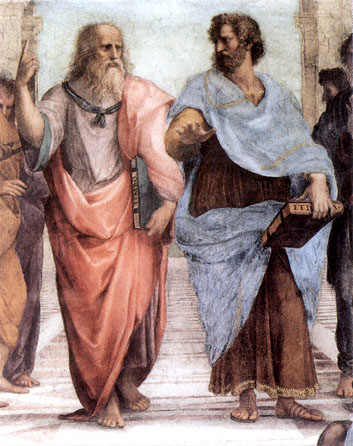 Plato & Aristotle (Aristotle [384-322BCE] was a student of Plato [428-348BCE]) Raphael ,The School of Athens (1510-11); fresco in the Vatican |
Instructor's note: Aristotle's Poetics (ca. 350BC) remains the most important description of tragedy, but it's not a rule-book. Aristotle describes tragedy as a genre and identifies qualities of excellent tragedies, but his ideas are open to discussion, development, and disagreement. Not all examples of tragedy conform to his description.
Aristotle was born a generation after the death of Euripides, last of the great classical Greek playwrights and a friend of Socrates, whose students included Plato, who taught Aristotle. See Greek Poets & Philosophers.
Aristotle became famous as the teacher of Alexander the Great (356-323BCE). In addition to Poetics, Aristotle wrote on physics, biology, ethics, politics, music, and metaphysics.
The "writings" of Aristotle may not have been written by himself. What we inherit as "Aristotle" may be notes compiled by his own students or their followers. (Compare the sayings of Jesus and the authors of the Gospels.)
![]()
from Aristotle, Poetics.. ca. 340 BCE. Text from S. H. Butcher, translator, Aristotle's Theory of Poetry and Fine Art, 4th ed. (NY: Dover, 1955)
[Highlights are bolded and minor editorial changes made by instructor for clarity and inclusive language.]
I. Epic poetry and tragedy, comedy also . . . are all in their general conception modes of imitation [mimesis]. Epic and drama differ, however, from one another in three respects—the medium [narration or dialogue], the objects, the manner or mode of imitation [i.e., comic or tragic narrative], being in each case distinct. . . .
II. . . . Comedy aims at representing men as worse, Tragedy as better than in actual life. . . .
III. . . . from one point of view, Sophocles is an imitator of the same kind as Homer—for both imitate higher types of character; from another point of view, of the same kind as Aristophanes [author of Lysistrata]—for both [Sophocles & Aristophanes] imitate persons acting and doing. Hence, some say, the name of 'drama' is given to such poems, as representing action. For the same reason the Dorians claim the invention both of Tragedy and Comedy. The claim to Comedy is put forward by the Megarians—not only by those of Greece proper, who allege that it originated under their democracy, but also by the Megarians of Sicily, for the poet Epicharmus, who is much earlier than Chionides and Magnes, belonged to that country.
[The origin of] tragedy too is claimed by certain Dorians of the Peloponnese. In each case they appeal to the evidence of language. The outlying villages, they say, are by them called komai, by the Athenians demoi: and they assume that comedians were so named not from komazein, 'to revel,' but because they wandered from village to village (kata komas), being excluded contemptuously from the city. . . . [Aristotle continues to associate comedy with common people, in this case the common people of villages rather than the nobility of the city, who are better represented in tragedy. Modern scholars reverse Aristotle's speculation about comedy's etymology, associating the word with "revel."]
IV[a]. Poetry in general seems to have sprung from two causes, each of them lying deep in our nature.
First, the instinct of imitation is implanted in people from childhood, one difference between humans and other animals being that people are the most imitative of living creatures, and through imitation we learn our earliest lessons; and no less universal is the pleasure felt in things imitated . . . .
The cause of this again is, that to learn gives the liveliest pleasure, not only to philosophers but to people in general; whose capacity, however, of learning is more limited. Thus the reason why men enjoy seeing a likeness [a portrait] is, that in contemplating it they find themselves learning or inferring, and saying perhaps, "Ah, that is he." For if you happen not to have seen the original, the pleasure will be due not to the imitation as such, but to the execution, the coloring, or some such other cause. [That is, by criticizing the portrait, one learns two things: 1) what the subject is really like, its nature and meaning; and 2) how such a subject is best rendered, or the best and worst techniques or styles of imitation.]
[4b] Imitation, then is one instinct of our nature. Next, there is the instinct for 'harmony' and rhythm, meters being manifestly sections of rhythm. Persons, therefore, starting with this natural gift developed by degrees their special aptitudes, till their rude improvisations gave birth to Poetry.
. . . [W]hen Tragedy and Comedy came to light, the two classes of poets still followed their natural bent: the lampooners [satirists] became writers of Comedy, and the Epic poets were succeeded by Tragedians, since the drama was a larger and higher form of art.
Poetry now diverged in two directions, according to the individual character of the writers. The graver spirits imitated noble actions, and the actions of good men [i.e. tragedy]. The more trivial sort imitated the actions of meaner [lesser, baser] persons [i.e. comedy], at first composing satires, as the former did hymns to the gods and the praises of famous men.
[4c] Aeschylus [author of Agamemnon, Oresteia] first introduced a second actor; he diminished the importance of the Chorus, and assigned the leading part to the dialogue. [This progression conforms to Nietzsche's observation that, historically, the chorus interacting with a single protagonist precedes the introduction of actors who interact with each other.]
Sophocles raised the number of actors to three, and added scene-painting [references to setting? or stage directions?]. . . .
V. Comedy is . . . an imitation of characters of a lower type . . . . It consists in some defect or ugliness which is not painful or destructive. To take an obvious example, the comic mask is ugly and distorted, but does not imply pain.
![]()
Examples of comedy as "lower type," "ugly and
distorted" but without "pain."
(more recent examples at bottom
of page)
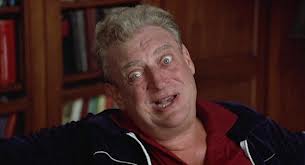 Rodney Dangerfield (1921-2004) |
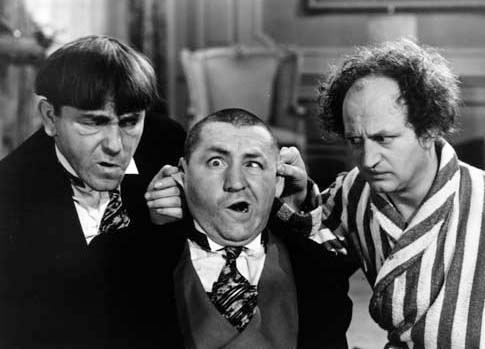 The Three Stooges (mid-20th century) |
In contrast, Tragedy features "noble" characters of a
higher type and some beauty that is threatened by danger.
(Note for instance
the tragic pictures' symmetry versus the comic pictures' "distortion.")
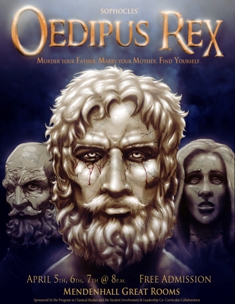 |
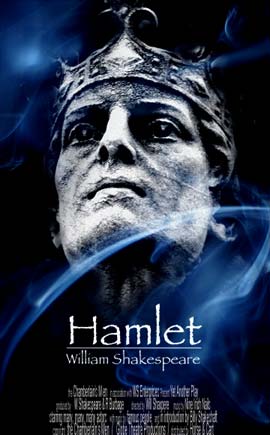 |
![]()
VI[a]. Tragedy . . . is an imitation of an action that is serious, complete, and of a certain magnitude . . . ; in the form of action*, not of narrative, through pity and fear** effecting the proper purgation [catharsis] of these emotions. . . . ["action, not . . . narrative": "action" = actors on a stage, or drama / dialogue (formal genre 2b); "narrative" = a storyteller or narrator instead of actors; **Compare the pity & fear of catharsis to the combined pleasure / pain or beauty / terror of the sublime]
[6b] Now as tragic imitation implies persons acting, it necessarily follows in the first place, that spectacular equipment will be a part of Tragedy. [That is, just putting actors, props, and scenery on stage is something of a spectacle, so spectacle or "spectacular equipment" is "part of tragedy," but not the purpose of tragedy, which is to enact a beautifully frightening or grievous story.]
[6c] Again, tragedy is the imitation of an action, and an action implies personal agents, who necessarily possess certain distinctive qualities both of character and thought; for it is by these that we qualify actions themselves, and these—thought and character—are the two natural causes from which actions spring, and on actions again all success or failure depends. Hence, the plot is the imitation of the action—for by plot* I here mean the arrangement of the incidents. . . . [*plot = narrative]
[6d] But most important of all is the structure of the incidents. For tragedy is an imitation, not of men, but of an action and of life, and life consists in action . . . . Now character determines men's qualities, but it is by their actions that they are happy or the reverse. . . . [T]he most powerful elements of emotional interest in tragedy—peripeteia or reversal of the situation, and recognition scenes—are parts of the plot. A further proof is, that novices in the art attain to finish of diction and precision of portraiture before they can construct the plot. . . . [recognition scene: e.g., Libation Bearers 280]
[6e] The plot, then, is the first principle, and, as it were, the soul of a tragedy: character holds the second place. A similar fact is seen in painting. The most beautiful colors, laid on confusedly, will not give as much pleasure as the chalk outline of a portrait. . . .
[6f] Character is that which reveals moral purpose, showing what kinds of things a man chooses or avoids. . . . [see also 13b below for "tragic flaw"]
[6g] The spectacle has, indeed, an emotional attraction of its own, but, of all the parts, it is the least artistic, and connected least with the art of poetry. For the power of tragedy, we may be sure, is felt even apart from representation and actors. Besides, the production of spectacular effects depends more on the art of the stage machinist than on that of the poet. . . .
VII. Now, according to our definition, tragedy is an imitation of an action that is complete, and whole, and of a certain magnitude . . . . A whole is that which has a beginning, a middle, and an end.
VIII. As therefore, in the other imitative arts, the imitation is . . . one action and that a whole [i.e. complete], the structural union of the parts being such that, if any one of them is displaced or removed, the whole will be disjointed and disturbed. For a thing whose presence or absence makes no visible difference, is not an organic part of the whole. [Each part of the whole tragedy is essential to its imitation; contrast satire, which is a "mixed dish" of disparate parts.]
IX.[a] [I]t is not the function of the poet to relate what has happened, but what may happen—what is possible according to the law of probability or necessity. Poetry . . . is a more philosophical and higher thing than history: for poetry tends to express the universal, history the particular. . . .
[9b] [T]he poet or maker should be the maker of plots rather than of verses; since he is a poet because he imitates, and what he imitates are actions. . . . [that is, a poet or writer is a story-teller first, and only secondarily a person who writes pretty or pleasing lines; plot remains "the soul of tragedy" (6e).]
[9c] Of all plots and actions the episodic are the worst. I call a plot "episodic" in which the episodes or acts succeed one another without probable or necessary sequence. . . .
[9d] But again, tragedy is an imitation not only of a complete action, but of events inspiring fear or pity [catharsis]. Such an effect is best produced when the events come on us by surprise; and the effect is heightened when, at the same time, they follow as cause and effect. . . .
XI [a]. Reversal of the situation is a change by which the action veers round to its opposite, subject always to our rule of probability or necessity. Thus in the Oedipus, the messenger comes to cheer Oedipus and free him from his alarms about his mother, but by revealing who he is, he produces the opposite effect. . . .
[11b] Recognition, as the name indicates, is a change from ignorance to knowledge, producing love or hate between the persons destined by the poet for good or bad fortune. The best form of recognition is coincident with a reversal of the situation, [creating a complex plot,] as in the Oedipus. . . . This recognition, combined with reversal, will produce either pity or fear [catharsis]; and actions producing these effects are those which, by our definition, tragedy represents. . . .[Oedipus the King ll. 1106-7, 1192-3, 1215-16, 1405; Bacchae ll. 1581+]
XIII[a]. [A perfect tragedy should] imitate actions which excite pity and fear [catharsis], this being the distinctive mark of tragic imitation. It follows plainly, in the first place, that the change of fortune presented must not be the spectacle of a virtuous man brought from prosperity to adversity: for this moves neither pity nor fear; it merely shocks us. Nor, again, that of a bad man passing from adversity to prosperity: for nothing can be more alien to the spirit of tragedy; it possesses no single tragic quality; it neither satisfies the moral sense, nor calls forth pity or fear.
[13b] Nor, again, should the downfall of the utter villain be exhibited [as in romance narrative]. A plot of this kind would, doubtless, satisfy the moral sense, but it would inspire neither pity nor fear; for pity is aroused by unmerited misfortune, fear by the misfortune of a man like ourselves. Such an event, therefore, will be neither pitiful nor terrible. There remains, then, the character between these two extremes—that of a man who is not eminently good and just, yet whose misfortune is brought about not by vice or depravity, but by some error or frailty [Gk hamartia; meaning "error" or "missing the mark"; the "tragic flaw"]. He must be one who is highly renowned and prosperous—a personage like Oedipus, Thyestes, or other illustrious men of such families. . . . [As tragedy modernizes, the tragic hero may be less "renowned and prosperous," more subordinate or middle-class, as with Death of a Salesman.]
[13c] [T]he best tragedies are founded on the story of a few houses [i.e., families]—on the fortunes of Alcmaeon, Oedipus, Orestes, Meleager, Thyestes, Telephus, and those others who have done or suffered something terrible. . . . [T]hey are in error who censure Euripides just because . . . his plays . . . end unhappily. It is, as we have said, the right ending. The best proof is that on the stage and in dramatic competition, such plays, if well worked out, are the most tragic in effect; and Euripides, faulty though he may be in the general management of his subject, yet is felt to be the most tragic of the poets. . . .
XIV[a]. Fear and pity may be aroused by spectacular means; but they may also result from the inner structure of the piece, which is the better way, and indicates a superior poet. For the plot ought to be so constructed that, even without the aid of the eye, he who hears the tale told will thrill with horror and melt to pity at what takes place [catharsis]. This is the impression we should receive from hearing the story of Oedipus. Those who employ spectacular means to create a sense not of the terrible but only of the monstrous, are strangers to the purpose of tragedy; for we must not demand of tragedy any and every kind of pleasure, but only that which is proper to it. And since the pleasure which the poet should afford is that which comes from pity and fear through imitation, it is evident that this quality must be impressed upon the incidents.
[14b] Let us then determine what are the circumstances which strike us as terrible or pitiful. [catharsis; compare sublime]
[14c] Actions capable of this effect must happen between persons who are either friends or enemies or indifferent to one another. If an enemy kills an enemy, there is nothing to excite pity either in the act or the intention—except so far as the suffering in itself is pitiful. So again with indifferent persons. But when the tragic incident occurs between those who are near or dear to one another—if, for example, a brother kills, or intends to kill, a brother, a son his father, a mother her son, a son his mother, or any other deed of the kind is done—these are the situations to be looked for by the poet.
XV[a]. As in the structure of the plot, so too in the portraiture of character, the poet should always aim either at the necessary or the probable. . . . [T]he unraveling of the plot, no less than the complication, must arise out of the plot itself, it must not be brought about by the deus ex machina [Greek for "the god in the machine" or divine intervention]—as in the Medea . . . . The deus ex machina should be employed only for events external to the drama—for antecedent or subsequent events, which lie beyond the range of human knowledge, and which require to be reported or foretold; for to the gods we ascribe the power of seeing all things. Within the action there must be nothing irrational. If the irrational cannot be excluded, it should be outside the scope of the tragedy. Such is the irrational element of the Oedipus of Sophocles.
[15b] Again, since tragedy is an imitation of persons who are above the common level, the example of good portrait-painters should be followed. They, while reproducing the distinctive form of the original, make a likeness which is true to life and yet more beautiful. So too the poet, in representing men who are irascible or indolent [as in low comedy], or have other defects of character, should preserve the type and yet ennoble it.
XVIII [a]. Every tragedy falls into two parts—complication and unraveling or denouement. . . .
[18b] The chorus too should be regarded as one of the actors; it should be an integral part of the whole, and share in the action, in the manner not of Euripides but of Sophocles.
![]()
More examples of comedy as "lower type," "ugly and distorted" but without "pain."
see also "Deadpan"
Carrie Brownstein of Portlandia
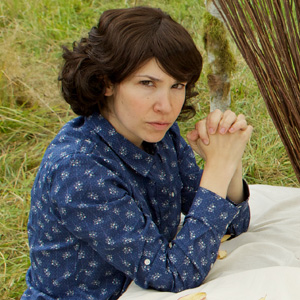 |
 see also "deadpan" |
Tina Fey and Julia Louis-Dreyfus
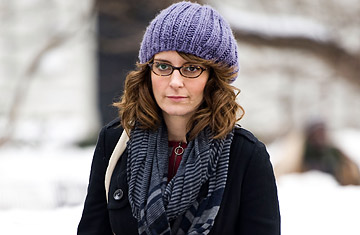 |
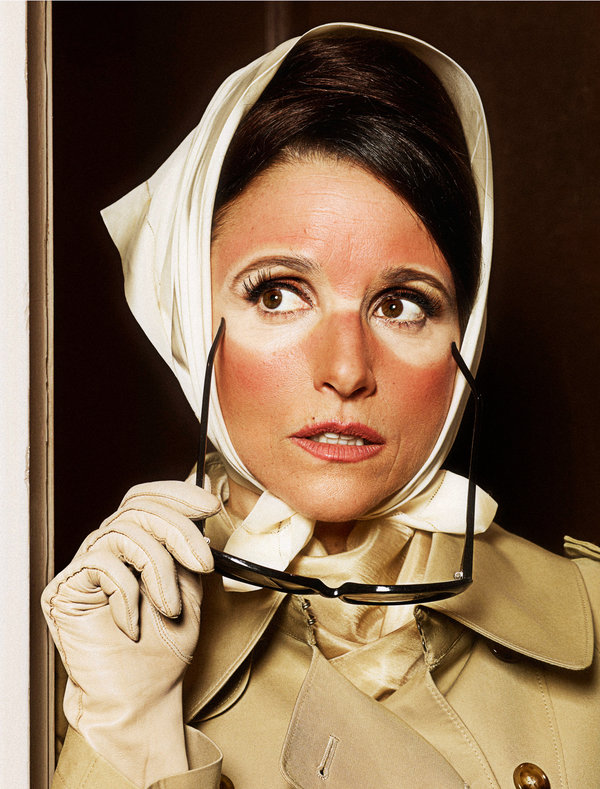 |
Tina Belcher of Bob's Burgers
 |
 |